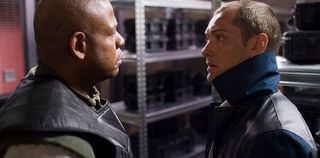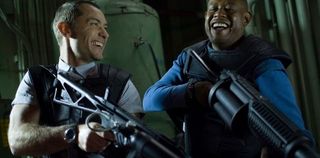Interview: Jude Law And Forest Whitaker Are Repo Men

Individually, Jude Law and Forest Whitaker may not be the most threatening guys-- Law is whippet thin and English, for god's sake, while Whitaker does the gentle giant thing probably more often than he goes all Last King of Scotland bellowing. But put them together and arm them with knives and a lot of information about the human body, and you don't just have a terrifying encounter-- you've got Repo Men.
In Miguel Sapochnik's debut film, Law and Whitaker play lifelong friends who now make their money reclaiming artificial organs from people who can no longer pay. The movie is far funnier and looser than most dark futuristic stories, and a lot of that comes from Whitaker and Law, who work their friendly chemistry to make every scene between them totally hypnotizing. We got the chance to talk to them last week during a press conference, about the movie's wacky tone, their favorite scene that got cut, and who would win in a fight. Check it out below, and see Repo Men in theaters this Friday.

This movie really touches on the current debate over health care. What's your perspective?
Jude Law: What’s always interesting about dystopian films, [when they] reference current themes, they don’t hit you over the head with them. Don’t forget we made this film two and a half years ago, so it was an issue, but it wasn’t as current as it is now. It’s just very fortuitous that the world is as messed up as it is and played right into the hands of our movie. I think the more interesting theme is in the film is how there can be corporations who can sell you stuff and it’s bad for you, because they know they’re the company that’s going to sell you stuff that’s good for you. They’ll cut off your nose with one hand and sell you a nose with another.
How much back story did you develop for your characters together?
Forest Whitaker: I think Jude worked on the script for a while with Miguel at the beginning of the film.I came on towards the end, and there was just discussions, little discussions to complete the world to create this weird universe that we were going to live in.
Jude Law: It’s not something you sit around and create or orchestrate, because that’s like dissecting a friendship, which seems unhelpful. We did both have our filmmaker hats on to fight for certain scenes, in flashbacks, in which an awful lot did get cut in the end. We particularly thought it was important to see them in combat together. Another theme in this film is very much how to do with we have all these governments around the world who train men to kill, and then when they come home, that’s not there anymore. We have more war vets than ever before, and what’s interesting in this film is they’re given a place to go use their skills, and when that breaks down, what are they going to do? Go be normal citizens?
CINEMABLEND NEWSLETTER
Your Daily Blend of Entertainment News
Do you see the movie's violence as being over the top, or were you enjoying it?
Jude Law: We knew when we read it that it was going to be extreme. I constantly thought, how much are we going to be able to get away with? Again, the idea of these two men in a society that’s desensitized to violence, it was important to the theme of violence, and that the graphic nature of the violence be very real. The journey of film broadens, especially towards the end, when it becomes almost unreal, this level of violence, this grotesque use of the body. You suddenly start to realize, you’ve been so brought into the world that you continue to believe in it. I hoped that it was a film that would make you close your eyes, especially young people when they’re watching that sort of stuff, it doesn’t do anything to them, and I hope this one does, that’s it’s shocking, because it should be. Violence is shocking.
Forest did you have to hide your director hat?
Forest Whitaker: I think every great movie is its own universe, its own world, with its own rules and stuff. What [director Miguel Sapochnik] did was create a universe that allows you to fall into it, and believe and trust in what we’re doing. We would do anything, as far as we needed to, inside the truth of what this universe was.
We heard you did a lot of training. Who has the best kung fu?
Jude Law: We never really had it out. The truth of the matter is we didn’t do a lot of the fight sequences, the producers don’t want you to pull a muscle or be injured, so they do these trainings to get you in good shape. But we had a quite bit of training and there was an awful lot of choreography.
Forest Whitaker: For my kung fu grip.
Jude Law: I had to catch up with you.

What stuff was cut that you guys miss?
Jude Law: They cut my favorite scene…
Forest Whitaker: It was Christmas…
Jude Law: There was a Christmas scene. It had just snowed in toronto, and there was this little house that was covered in lovely Santa lights, and we just covered each other in blood, and we come out of the house just laughing, having just done our first repo, and we walk down the street. It was my favorite scene.
Jude, what kind of notes did you give on the script?
Jude Law: You’ll have to ask them. Oh, yeah, I remember one note. I wanted people to like Carol [his wife, played by Carice van Houten]. Carol was just a bitch, and I was thinking it wasn’t fair, it should be a balanced relationship. it’s more touching when see a relationship with two healthy,rounded people falling apart, than someone leaving someone because they’re a pain in the ass, you know? I was just really taken by the characters and with the heart of the film. I can’t remember what I contributed, to be really honest. I think it became very much a part of what we then filmed and that process is very fluid. I should keep notes so I can claim ideas for myself.
Staff Writer at CinemaBlend
Most Popular





